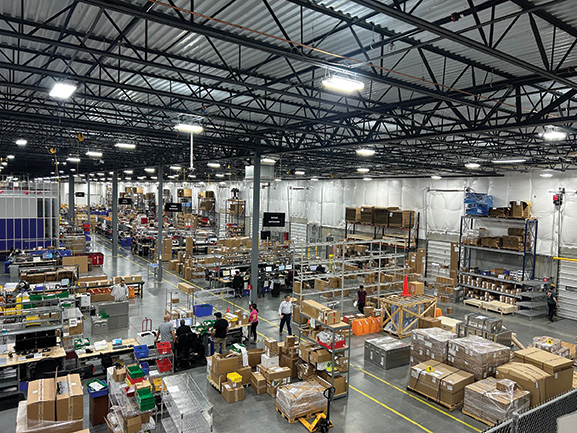Volume 27 | Issue 3
Click here to read the complete illustrated article or continue below to read the text article.
In early 2024, lawmakers announced $35 million in federal grant money allocated by the Bipartisan Infrastructure Law to upgrade the terminal facilities at Washington Dulles International Airport. The new 14-gate, 400,000-sq.-ft. terminal will include connection to the AeroTrain and the Washington Metro Silver Line. These new features are just a few of the many ways Dulles is taking off as a hub for logistics management on the East Coast.
Dulles International Airport is an emerging air cargo gateway in the Mid-Atlantic region that serves a large catchment area along the East Coast. Dulles opened in Northern Virginia, 26 miles west of Washington, D.C., in 1962, following through on a choice made four years earlier by an American president who knew the important intersection of land and strategy: Dwight D. Eisenhower. By the start of this century, the airport was one of the fastest-growing in the world and a gateway to America’s East Coast.
With its strategic Mid-Atlantic location and access to international markets, Dulles is a major asset to the East Coast supply chain and a strong location for international cargo, and VEDP is partnering with the Washington Airports Task Force on a consultative study to evaluate cargo market share opportunity for the airport. Currently, Dulles handles more than 300,000 tons of cargo annually and is serviced by 41 airlines providing connections to 57 international and 86 domestic destinations.
Dulles carried more than 25 million passengers in 2023, and 21,171 passenger flights took off in December alone.
That volume hasn’t hurt the airport’s efficiency. In July, AirHelp, a passenger rights tech company, released its annual rankings of the world’s best airports, rating the facilities on on-time performance, service quality, claims processing, customer opinion, food and shops. Dulles came in at No. 11 worldwide, with only Salt Lake City ranking higher among American airports.
Dulles’s advantageous location draws numerous major industries that value reliability and attention to detail — biotech, pharmaceutical, and medical device companies value Dulles’s ability to handle delicate product quickly and safely. Another major Dulles customer is the fast-growing data center industry, drawn by the presence of “Data Center Alley” in nearby Loudoun County, the world’s largest concentration of such facilities. Major tech companies take advantage of the airport’s reliable reputation to supply their nearby data centers.

Irish multinational company Hanley Energy helps partners including data center operators use energy more efficiently. The company found a Dulles location was ideal to serve its customers, and in 2023, announced an expansion 20 times larger than the company’s original Virginia property.
“We had learned from a number of other offices we’d opened around the world that were much greater travel and distances from airports and infrastructure that it really made it very difficult, when you were flying in, to be effective,” said Hanley CEO Clive Gilmore. “We were 10–15 minutes from [Dulles]. That was the first criteria for the office.”
The airport connects to all major U.S. markets via the interstate highway system, including the nearby Capital Beltway and Interstates 95 and 66, with major freight thoroughfare Interstate 81 not far to the west. As the primary international airport for the Washington metro area, Dulles serves one of the major economic regions in the United States with a continuously growing number of international airlines. While Baltimore and Richmond are well-known short trips from Dulles, more than 56 percent of the U.S. population resides within a one-day drive, extending the airport’s effective footprint hundreds of miles from the airport in every direction.
Also convenient are key facilities operated by The Port of Virginia, including the Virginia Inland Port an hour west in Warren County, while the port’s Hampton Roads facilities are just over 200 miles away by road. The World Bank Group ranked the port as the most efficient large port in North America in 2022, and major hardware retailer Lowe’s Companies, Inc. rated it as its International Port of the Year in 2022 and 2023, with the company citing the port’s “best-in-class partnership” and calling the port “highly engaged and responsive to any opportunity where they can provide additional value supporting our cargo flow.”
It’s Virginia’s infrastructure that has driven importers to use Dulles to serve markets up and down the East Coast and as far away as Michigan. While other airports may be closer to the end customer, Dulles’s reliability gives it a crucial edge, leading major freight forwarders like Kuehne+Nagel to set up dedicated facilities at the airport. That location also confers advantages through its proximity to the nearby federal government — the Transportation Safety Administration routinely conducts demos at Kuehne+Nagel’s Dulles facility, which branch manager Marc Barlund says “helps us know what trends are coming.”
Other major freight companies have realized the advantages of a Dulles partnership. Dutch aviation giant Airbus has made the decision twice — first with a customer service and parts center in 1990, then through a subsidiary, Satair, in 2019. As David Kelley, Satair’s head of operations for the Americas, put it, “We looked at talent and resources in the region. We looked at freight routes and international airports and [concluded] that Loudoun County was the best place to do business.”
Also working in Dulles’s favor is its location in Virginia’s welcoming climate — in more ways than one. The Commonwealth’s sensible, stable business climate and the advantages it offers companies are well known, but Virginia also has an advantageous climate in the more traditional sense, with companies attracted to the lack of disruptions.
Dulles also operates under another name that shows its advantages for companies: Foreign Trade Zone 37. That status confers numerous advantages to companies that use the airport as a gateway, notably tariff reductions to qualifying businesses located within 60 miles. Dulles’s air cargo amenities include bonded warehousing and refrigerated and ambient-temperature-controlled storage spaces.
Dulles is taking proactive steps to maintain its advantages and seek novel ways of using its assets. The Metropolitan Washington Airports Authority is working with Dominion Energy on a 100MW solar project with a battery storage system. Set to come online in 2026, the array will give Dulles the most solar capacity of an U.S. airport.

About the Author:
Eric Jehu serves as vice president of transportation and logistics at the Virginia Economic Development Partnership, where he provides leadership for developing and implementing strategies to promote employment growth within the logistics industry in Virginia.
Scott Ellyson, CEO of East West Manufacturing, brings decades of global manufacturing and supply chain leadership to the conversation. In this episode, he shares practical insights on scaling operations, navigating complexity, and building resilient manufacturing networks in an increasingly connected world.